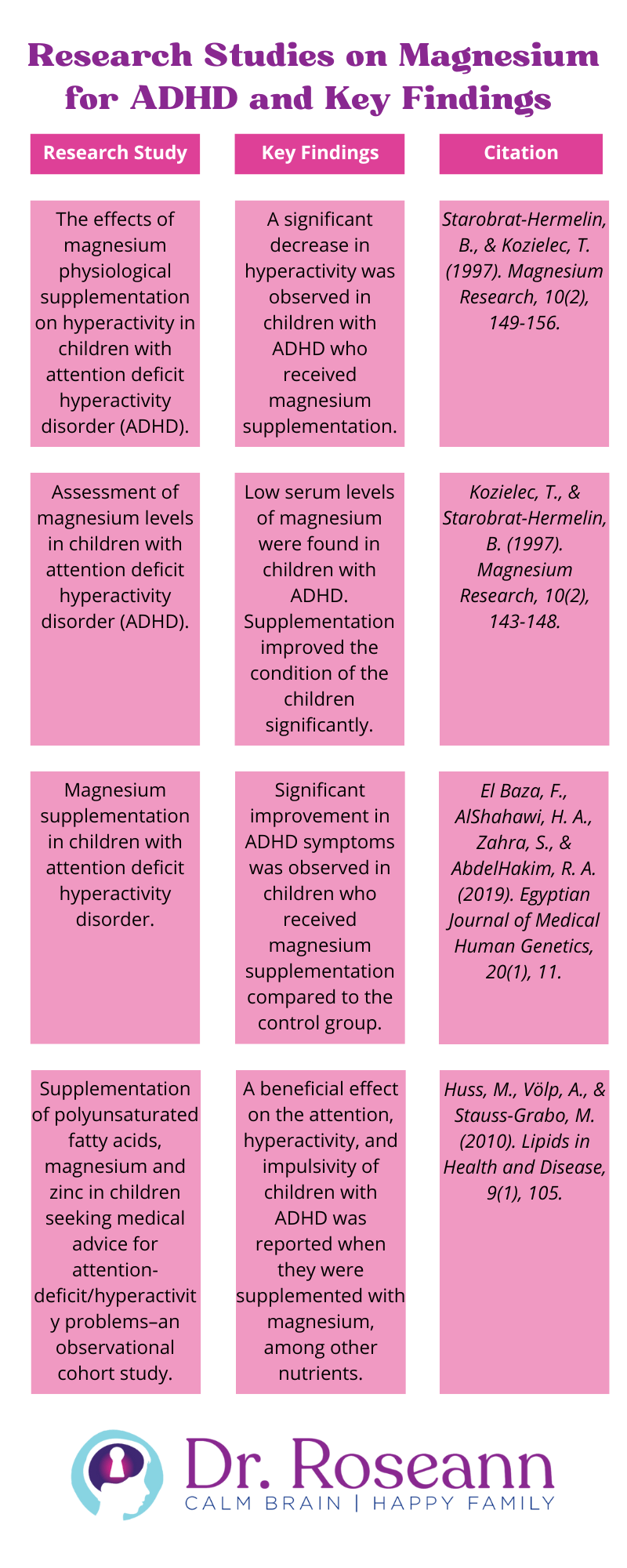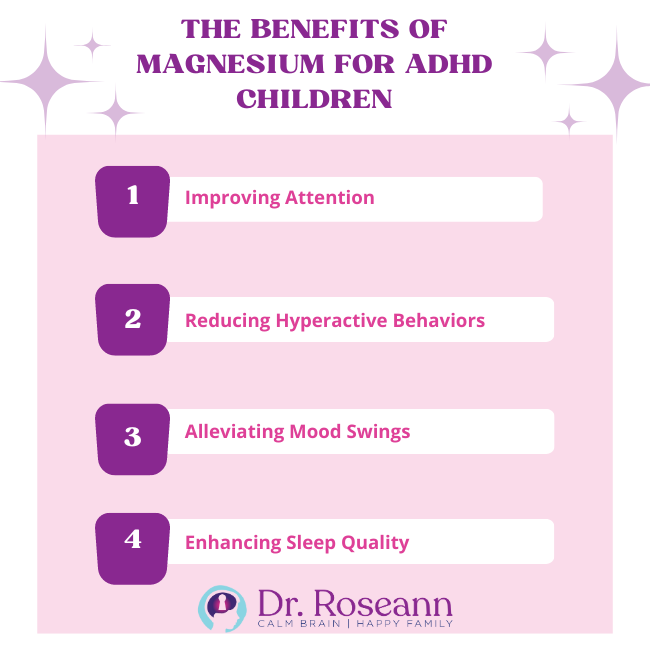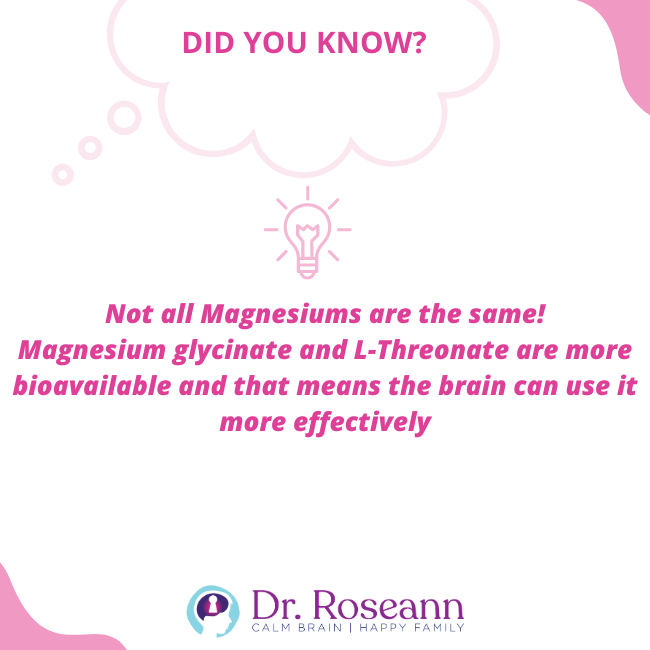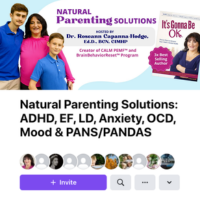Magnesium is the unsung hero in the mineral kingdom. It is like that quiet worker backstage who keeps the show running smoothly but never gets a standing ovation. Magnesium helps in over 300 biochemical reactions in the body, playing an essential role in everything from energy production to nerve function, and even to the creation and repair of DNA. These are just some of the benefits of using magnesium. Many kids are now taking magnesium for focus, and they are reaping the results.
More importantly, it's a key player in your child's brain health and function (Swaminathan, 2003). Imagine it as the stagehand who ensures that all the props (neurotransmitters) are in the right place, the lighting (neural pathways) is on point, and the entire performance (brain function) goes off without a hitch.
Low Levels of Magnesium and its Link to an Unfocused Brain
Here's a plot twist you probably didn't see coming: your child might be running low on magnesium levels. A deficiency in this essential mineral could be one of the villains in our ADHD story. Taking magnesium for brain health could reverse this. This is why magnesium is important to the body.
Several research studies suggest that low serum levels of magnesium could be associated with ADHD (Starobrat-Hermelin & Kozielec, 1997). Think of it this way – it's like trying to drive a top-of-the-line Ferrari with an empty fuel tank; it just won't deliver the performance it's capable of.
Research Studies on the Role of Magnesium in Brain Function and Symptoms Related to Focus
The research on ADHD symptoms, magnesium and brain health paints a promising picture. It's like turning a corner on a gloomy day and finding a beautiful rainbow especially when you have a hyperactive child and you constantly find yourself saying, “Stop!” Magnesium has been shown to improve impulsive behaviors.
A randomized controlled trial – the Hollywood A-listers of research studies – found a significant correlation between magnesium supplementation and improvement in ADHD symptoms (El Baza et al., 2019). In the control group of children who did not receive magnesium supplements, the ADHD symptoms remained unchanged. It's a revelation that's as surprising as it is hopeful.

Does Magnesium Help with Focus?
When it comes to cognitive function and brain health, the role of magnesium in the body is not a supporting one; it's a lead actor. By helping to regulate the function of neurotransmitters – the body's internal messaging service – magnesium ensures the lines of communication within the brain remain open (Kirkland et al., 2018). That can mean an overall improvement in cognitive function and mental health.
A magnesium deficiency could disrupt this complex communication network. It's like trying to make a call with a poor signal – the connection is patchy, and messages don't get through efficiently. Improved neural communication is the main function of magnesium in the body.
The Benefits of Taking Magnesium Supplements on the Nervous and Immune Systems
Magnesium is best buddies with your nervous and immune systems, ensuring they function optimally. Think of it as the glue that keeps these two systems working in harmony.
Research suggests that magnesium, by supporting a well-functioning nervous system and a robust immune system, might support attention disordered related conditions like Pediatric Acute-onset Neuropsychiatric Syndrome (PANS) and Pediatric Autoimmune Neuropsychiatric Disorders Associated with Streptococcal infections (PANDAS) (Frankovich et al., 2015). For parents navigating the murky waters of these disorders, the pros of taking magnesium could be a beacon of hope.
How Much Magnesium Per Day is Recommended for Children with Focus Issues?
Navigating the nutrition maze for your ADHD child might seem as daunting as completing a Rubik's Cube blindfolded. But don't worry, I've got some tips to make it easier.
Magnesium-rich foods include dark leafy greens (think spinach and kale), whole grains (like quinoa and brown rice), nuts (almonds are an excellent choice), seeds (like pumpkin seeds), and – drumroll, please – dark chocolate! Yes, that's right, your child's love for chocolate might be beneficial.
The National Institutes of Health recommends a daily intake of magnesium of around 110 mg for children aged 4-8, and 350 mg for those aged over 8 (National Institutes of Health, 2021). This can help ensure that their little engines run smoothly.

How Does Magnesium Help Your Body and Alleviate Symptoms?
The idea of magnesium supplementation sounds almost magical, doesn't it? But this isn't a fairy tale – it's supported by solid scientific research. Studies suggest that supplementing with magnesium can lead to a significant reduction in ADHD symptoms, enhancing the overall mental health status of ADHD children (Kozielec & Starobrat-Hermelin, 1997).
This could be a game-changer for those navigating the stormy seas of ADHD because it supports the brain and body in those 300 chemical functions. With today's increase in stress, genetic mutations, and poor food quality, the answer is to boost magnesium supplementation. It is a safe and easy way to support the neurodivergent ADHD brain. And it is my favorite supplement for kids and adults!
Magnesium Glycinate vs. Other Magnesium Supplements
When it comes to magnesium supplements, remember that they're not all created equal. Some forms of magnesium, like magnesium glycinate, are more bioavailable, which means the body can use them more effectively than other forms such as magnesium oxide or citrate (Schuette et al., 1994).
So, when deciding on a magnesium supplement, it's worth doing your homework and maybe even consulting with a healthcare professional. The goal is to ensure that you're investing in a supplement such as brain powerhouses. Take advantage of the magnesium glycinate and magnesium L-threonate benefits for maximum effects.

How to Increase Magnesium in Your Child's Diet
If you're wondering how to embark on this covert operation of getting your child to consume magnesium-rich foods, don't worry – I've got you covered in our parent magnesium guide. From bananas and avocados to magnesium-fortified cereals and bread, there are numerous ways to incorporate this essential mineral into your child's diet.
It might take a bit of creativity, but consider it a culinary adventure. Before you know it, you'll be a pro at whipping up magnesium-packed meals and snacks. Magnesium changed my life. Taking magnesium supplements benefits my entire family. So do you.
Other Lifestyle Changes to Support Children and Teens with Focus Problems
Finally, it's worth noting that lifestyle plays a vital role in supporting ADHD children. Incorporating regular exercise, ensuring a balanced diet, and promoting good sleep hygiene can all support the efficacy of essential nutrients. It's about creating a holistic approach that supports your child's overall wellbeing and helps them to thrive, and thankfully there are many ways to reduce ADHD symptoms naturally. Using natural remedies for magnesium deficiency is the first step.
Focusing on gaining coping skills is extremely important for building real-world stress tolerance. Moreover, gaining executive functioning supports children at school and home. Ultimately, dysregulated kids need to learn how to self-regulate their brains and bodies.
Managing ADHD isn't a sprint; it's a marathon and that is what we teach parents every day. But with magnesium, the right behavioral support, a balanced diet, and a whole lot of love, we can all reach that finish line together. It's a journey filled with challenges, but the rewards – witnessing your child's progress and seeing them develop their unique strengths – make it all worth it.
Ready to improve your child's attention and behavior naturally? Don't miss out on our FREE quick start guide. Download it now at www.drroseann.com/natural-solutions-quick-start-guide.
Does magnesium help with inflammation?
Many experts recommend taking magnesium for inflammation and pain, as it has been shown to possess anti-inflammatory properties. Regular intake also provides lots of magnesium brain benefits, as adequate magnesium levels are essential for brain health and function.
Is magnesium anti inflammatory?
While magnesium is not directly classified as an anti-inflammatory agent, it has been linked to reduced inflammation levels in the body. Moreover, one of the benefits of magnesium for the brain includes supporting its health and function, contributing to cognitive processes, and aiding in the regulation of inflammatory responses.
What does magnesium do for the brain?
The best magnesium for brain health supports cognitive function by regulating neurotransmitter release, enhancing synaptic plasticity, and promoting overall neural health.
What does magnesium do for the body?
Magnesium and the brain go together as the former plays a crucial role in brain function by regulating neurotransmitter release and synaptic function. As for the body, magnesium and inflammation don’t mix, as magnesium possesses anti-inflammatory properties that can contribute to overall physical health and function.
How does magnesium make you feel?
The best magnesium for brain function can enhance cognitive performance and promote a sense of mental clarity and focus. Aside from such magnesium brain benefits, this mineral may also contribute to improved mood regulation and reduced stress.
What is magnesium good for?
The benefits of magnesium L threonate include promoting cognitive function and overall brain performance. Taking magnesium for memory loss is also recommended. L threonate is the type of magnesium that crosses the blood brain barrier, further enhancing its effectiveness in supporting brain health.
What happens when you take magnesium supplements?
The power of magnesium includes enhancing brain function due to its crucial role in neurotransmitter regulation and synaptic transmission. Increasing magnesium intake and brain function improvement are directly proportional.
Does magnesium reduce cortisol?
One of the functions of magnesium is to regulate the hypothalamic-pituitary-adrenal (HPA) axis, which controls the body's stress response and cortisol production. Adequate magnesium levels may help modulate cortisol secretion, potentially reducing its levels in times of stress. High absorption magnesium supplements benefits include better stress management.
What does magnesium do for ADHD?
Magnesium used for ADHD as a complementary treatment is common due to its potential benefits on cognitive function and behavior. Magnesium benefits children with ADHD because it helps regulate neurotransmitter activity, particularly dopamine. It also helps alleviate symptoms like hyperactivity and impulsivity.
Can you take more than one type of magnesium?
You can maximize the benefit of taking magnesium by having more than one type. Different forms of magnesium have varying absorption rates and effects on the body. Combining different magnesium for mental health can help promote mood regulation and stress management.
How fast does magnesium work?
When taking magnesium for the body, the speed it works can vary depending on factors such as the type of supplement used and individual metabolism. Generally, magnesium supplements can start to exert their effects within a few hours to a few days, but noticeable improvements may take several weeks of consistent supplementation, especially when it comes to magnesium and gut inflammation.
Can magnesium help repair nerve damage?
Taking magnesium for nerves and muscles helps support the nerve repair processes indirectly by promoting overall nerve health and function. While magnesium supplementation alone may not directly repair nerve damage, maintaining adequate magnesium levels can contribute to optimal nerve signaling and function. Using magnesium for nerve repair potentially aids in the recovery process alongside other therapeutic interventions.
What are the benefits of benefits of magnesium L-threonate?
The L-threonate magnesium benefits include improved brain health. With its ability to cross the blood-brain barrier magnesium levels are increased in the brain. However, parents should also know about the side effects of magnesium l-threonate when used in extremely high doses.
What does magnesium do for your skin?
Magnesium plays a vital role in maintaining healthy skin by supporting various cellular processes, including protein synthesis and cell regeneration. The benefits of taking magnesium pills, such as magnesium citrate, include improved skin health. Magnesium citrate benefits for skin are hydration support and inflammation regulation.
How does magnesium work?
Magnesium helps with energy production, protein synthesis, and muscle function. Reasons to take magnesium include supporting heart health, bone strength, and nerve function, as well as regulating blood sugar levels and blood pressure. The effects of taking magnesium may include improved sleep quality, reduced muscle cramps, enhanced cognitive function, and alleviation of symptoms related to anxiety and depression.
What helps your body absorb magnesium?
To enhance magnesium absorption, it's beneficial to consume it alongside foods rich in vitamin D, such as fatty fish, eggs, and fortified dairy products, as vitamin D facilitates magnesium absorption. Many people are taking magnesium for relaxation. For kids, magnesium for immune system boost is highly recommended.
Is magnesium calming?
Yes, calming is one of the many effects of magnesium on the brain. It plays a crucial role in regulating the GABA neurotransmitters, which are known to have calming and relaxing effects on the brain. Taking magnesium for stress is a good idea for overall physical and mental well-being.
Citations:
American Psychiatric Association. (2013). Diagnostic and statistical manual of mental disorders (5th ed.). APA DSM-5
Arnold, L. E., DiSilvestro, R. A., Bozzolo, D., Bozzolo, H., Crowl, L., Fernandez, S., Joseph, E., Kloepping, J., McNamara, J., Park, K., … & Wigal, T. (2005). Zinc for attention-deficit/hyperactivity disorder: placebo-controlled double-blind pilot trial alone and combined with amphetamine. Journal of Child and Adolescent Psychopharmacology, 15(1), 4-15. PubMed
Frankovich, J., Thienemann, M., Pearlstein, J., Crable, A., Brown, K., & Chang, K. (2015). Multidisciplinary clinic dedicated to treating youth with pediatric acute-onset neuropsychiatric syndrome: presenting characteristics of the first 47 consecutive patients. Journal of Child and Adolescent Psychopharmacology, 25(1), 38-47. PubMed
Huss, M., Völp, A., & Stauss-Grabo, M. (2010). Supplementation of polyunsaturated fatty acids, magnesium and zinc in children seeking medical advice for attention-deficit/hyperactivity problems–an observational cohort study. Lipids in Health and Disease, 9(1), 105. PubMed
Kirkland, A. E., Sarlo, G. L., & Holton, K. F. (2018). The Role of Magnesium in Neurological Disorders. Nutrients, 10(6), 730. PubMed
Kozielec, T., & Starobrat-Hermelin, B. (1997). Assessment of magnesium levels in children with attention deficit hyperactivity disorder (ADHD). Magnesium Research, 10(2), 143-148. PubMed
National Institutes of Health. (2021). Magnesium: Fact Sheet for Health Professionals. NIH
Rucklidge, J. J., Eggleston, M. J. F., Johnstone, J. M., Darling, K., & Frampton, C. M. (2019). Vitamin-mineral treatment improves aggression and emotional regulation in children with ADHD: a fully blinded, randomized, placebo-controlled trial. Journal of Child Psychology and Psychiatry, 60(3), 232-246. PubMed
Schuette, S. A., Lashner, B. A., & Janghorbani, M. (1994). Bioavailability of magnesium diglycinate vs magnesium oxide in patients with ileal resection. Journal of Parenteral and Enteral Nutrition, 18(5), 430-435. PubMed
Starobrat-Hermelin, B., & Kozielec, T. (1997). The effects of magnesium physiological supplementation on hyperactivity in children with attention deficit hyperactivity disorder (ADHD). Positive response to magnesium oral loading test. Magnesium Research, 10(2), 149-156. PubMed
Swaminathan, R. (2003). Magnesium metabolism and its disorders. The Clinical Biochemist Reviews, 24(2), 47–66. PubMed
Always remember… “Calm Brain, Happy Family™”
Are you looking for SOLUTIONS for your struggling child or teen?
Dr. Roseann and her team are all about solutions, so you are in the right place!
There are 3 ways to work with Dr. Roseann:
You can get her books for parents and professionals, including: It’s Gonna Be OK™: Proven Ways to Improve Your Child’s Mental Health, Teletherapy Toolkit™ and Brain Under Attack: A Resource For Parents and Caregivers of Children With PANS, PANDAS, and Autoimmune Encephalopathy.
If you are a business or organization that needs proactive guidance to support employee mental health or an organization looking for a brand representative, check out Dr. Roseann’s media page and professional speaking page to see how we can work together.
Dr. Roseann is a Children’s Mental Health Expert and Licensed Therapist who has been featured in/on hundreds of media outlets including The Mel Robbins Show, CBS, NBC, PIX11 NYC, Today, FORBES, CNN, The New York Times, The Washington Post, Business Insider, Women’s Day, Healthline, CNET, Parade Magazine and PARENTS. FORBES called her, “A thought leader in children’s mental health.”

She coined the terms, “Re-entry panic syndrome” and “eco-anxiety” and is a frequent contributor to media on mental health.
Dr. Roseann Capanna-Hodge has three decades of experience in working with children, teens and their families with attention-deficit hyperactivity disorder (ADHD), autism, concussion, dyslexia and learning disability, anxiety, Obsessive Compulsive Disorder (OCD), depression and mood disorder, Lyme Disease, and PANS/PANDAS using science-backed natural mental health solutions such as supplements, magnesium, nutrition, QEEG Brain maps, neurofeedback, PEMF, psychotherapy and other non-medication approaches.
She is the author of three bestselling books, It’s Gonna Be OK!: Proven Ways to Improve Your Child's Mental Health, The Teletherapy Toolkit, and Brain Under Attack. Dr. Roseann is known for offering a message of hope through science-endorsed methods that promote a calm brain.
Her trademarked BrainBehaviorResetⓇ Program and It’s Gonna be OK!Ⓡ Podcast has been a cornerstone for thousands of parents facing mental health, behavioral or neurodevelopmental challenges.
She is the founder and director of The Global Institute of Children’s Mental Health, Neurotastic™Brain Formulas and Dr. Roseann Capanna-Hodge, LLC. Dr. Roseann is a Board Certified Neurofeedback (BCN) Practitioner, a Board Member of the Northeast Region Biofeedback Society (NRBS), Certified Integrative Mental Health Professional (CIMHP) and an Amen Clinic Certified Brain Health Coach. She is also a member of The International Lyme Disease and Associated Disease Society (ILADS), The American Psychological Association (APA), Anxiety and Depression Association of America (ADAA) National Association of School Psychologists (NASP), International OCD Foundation (IOCDF).
© Roseann-Capanna-Hodge, LLC 2024
Disclaimer: This article is not intended to give health advice and it is recommended to consult with a physician before beginning any new wellness regime. *The effectiveness of diagnosis and treatment vary by patient and condition. Dr. Roseann Capanna-Hodge, LLC does not guarantee certain results.













